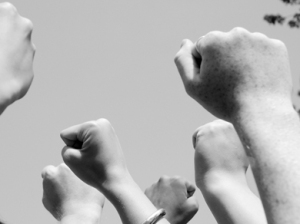Today’s guest post is from Carol. “Learning the Words” is a series on the words many of us didn’t have in fundamentalism or conservative evangelicalism– and how we got them back. If you would like to be a part of this series, you can find my contact information at the top.
“It’s going to be especially hard on her, because she has convictions.”
My mom was talking about my 11-year-old niece, who was about to start attending public middle school. I had to bite my tongue and change the subject. Did she think that I did not have the same “convictions” at that age? To her, my becoming a liberal and dropping out of our Southern Baptist church must’ve seemed like I just…didn’t believe hard enough in the things that I had been taught. I wasn’t strong enough.
To my mom, my niece is not like the other kids her age, who are being deluded and probably have divorced parents who drink alcohol at home. And she’s especially not like those godless public school teachers who insist on exposing her to evolution and alternate December holidays. And she’s not like me, who wavered, and then left the faith.
Just like I did when I was her age, my niece firmly believes in Southern Baptist teachings: biblical literalism, creationism, the importance of accepting Jesus as “your personal Lord and Savior,” and all the rest. And why wouldn’t she? Everyone she loves and trusts has told her how important it is, and she sincerely wants to do what’s right.
But to my mom, the development of your convictions should stop there.
~~~~~~~~~~
After this conversation, it struck me that I hadn’t heard–much less spoken–the word “convictions” in years. I want less to reclaim the word itself than to banish it from my vocabulary altogether, and replace it with something more meaningful.
“Convictions” was a character trait to be admired in the world I came from: it meant that you stood up for what you believed and yelled loudly for your team. But most importantly, if you have convictions, you stick to them, no matter what arguments you might hear against them. There is, of course, a very dark side to that, because it doesn’t allow any room for questions or growth.
For me, changing my beliefs was one of the hardest things I’ve done and took strength and perseverance. It did not mean caving to a powerful argument from someone else. Instead, it meant allowing myself to examine my beliefs and change them to something I thought was better. This was in opposition to the pressure to remain exactly like I was at age 11, when my “convictions” were just right.
Ironically, leaving my family’s faith meant staying true to my real convictions more than standing still would have. Once I started questioning and being honest with myself, my only other choices were to live in denial, or hypocritically play a part that I no longer agreed with.
~~~~~~~~~~
Everyone has convictions, or deeply held beliefs. My niece isn’t unique among her peers in that respect. What is different in her case, however, is how those convictions are viewed.
“Convictions” should not mean a dogma that is handed down. And standing strong in your convictions should not mean stubborn refusal to change or listen to other points of view.
It goes without saying that we should try to do what we believe is beneficial and promote ideas we think are good. But we should also accept that those beliefs can–and should–develop. Our dogma should not be more important than our actual, continually developing, convictions.



